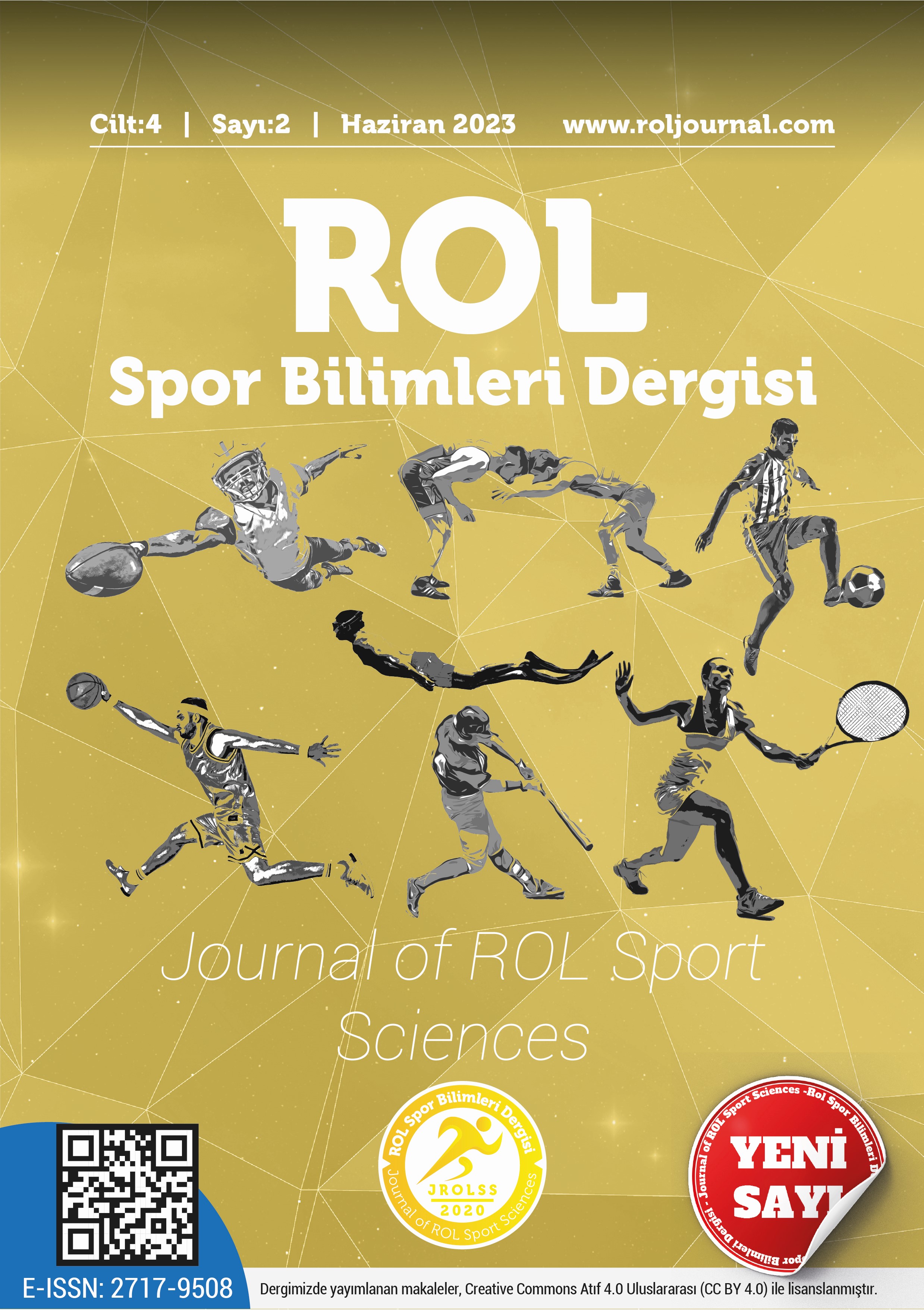The relationship between ruminative thought styles and decision-making styles in individuals doing physical activity in the context of bad habits
DOI:
https://doi.org/10.5281/zenodo.7944238Keywords:
Sports, rumination, decision-making, addiction, alcohol and smokeAbstract
The purpose of this research, examine the relationship between ruminative thought styles and decision-making styles in individuals doing physical activity within the context of bad habits. The scanning model was used in the research. The sample of the study consists of a total of 746 individuals engaged in physical activity. The correlation coefficient technique was used to find the link between them the ruminative thought styles and the decision-making styles of the participants. The “Ruminative Thought Style Questionnaire” and “Melbourne Decision Making Questionnaire” were used in the research. SPSS statistical used to find the results data. As a result, no relationship was found between ruminative thought styles and decision-making styles of individuals who did not have bad habits (smoking and alcohol). In individuals who had bad habits and used cigarettes and alcohol, found to be significant moderate degree of relationship between ruminative thought styles and the buck-passing decision-making style from the sub-dimensions of decision-making styles. It was also revealed that there was a negative moderate degree of relationship between the ruminative thought styles concluding styles of individuals who were non-smokers but used alcohol. Also, it was proved that there was a negative low degree of relationship between the ruminative thought styles concluding styles of smokers and non-alcoholic individuals.
References
Brinker, J. K., & Dozois, D. J. (2009). Ruminative thought style and depressed mood. Journal Of Clinical Psychology, 65(1), 1-19.
Bugay, A., & Erdur, Ö. (2011). Ruminasyon düzeyinin toplumsal cinsiyet ve yaşa göre incelenmesi. Türk Psikolojik Danışma ve Rehberlik Dergisi, 4(36), 191-201.
Burhanoğlu, S. (2020, Aralık 21). Ruminasyon (rumination) kavramı nedir? www.sabriburhanoglu.com.
Büyüköztürk, Ş., Kılıç, E., Akgün, Ö. E., Karadeniz, Ş., & Demirel, F. (2020). Bilimsel araştırma yöntemleri, Pegem Akademi.
Carney, C., & Wells, C. (2023). Discover the career within you, Cole Publishing Company.
Craig, C., & Watson, G. (2011). An affordance based on approach to decision making in sport: discussing a novel methodological framework. Revista de Psicologia del Deporte, 20(2), 689-708.
Daft, R. L. (1994). Managerial decision making management, The Dryden Pres.
Deniz, M. E. (2004). Üniversite öğrencilerinin karar vermede öz saygı karar verme stilleri ve problem çözme becerileri arasındaki ilişkinin incelenmesi üzerine bir araştırma. Eğitim Araştırmaları Dergisi, (15).
Dodge, K. A. (1991). The structure and function of reactive and proactive aggression. The Development And Treatment Of Childhood Aggression, 16(5), 201-18.
Garnefski, N., & Kraaij, V. (2007). The cognitive emotion regulation questionnaire. European Journal of Psychological Assessment, 23(3), 141-149.
Gençtan, E. (2004). Psikanaliz ve sonrası, Metis Yayınları.
Gross, J. J. (1998). The emerging field of emotion regulation: An integrative review. Review of General Psychology, 2(3), 271-299.
Ito, T., Takenaka, K., Tomita, T., & Agari, I. (2006). Comparison of ruminative responses with negative rumination as a vulnerability factor for depression. Psychological Reports, 99(3), 763-772.
Just, N., & Alloy, B. L. (1997). The response style theory of depression: tests and an extension theory. Journal of Abnormal Psychology, 106(12), 221-229.
Karasar, N. (2015). Bilimsel araştırma yöntemi, Nobel Akademik Yayıncılık.
Karatepe, H. T. (2010). Ruminatif düşünce biçimi ölçeğinin türkçe uyarlaması, geçerlik ve güvenirlik çalışması [Tıpta uzmanlık tezi, Sağlık Bakanlığı]. İstanbul.
Kuzgun, Y. (2000). Meslek danışmanlığı, Nobel Yayın Dağıtım.
Lynn, S. J., Barnes, S., Deming, A., & Accardi, M. (2010). Hypnosis, rumination, and depression: catalyzing attention and mindfulness-based treatments. Intl. Journal of Clinical and Experimental Hypnosis, 58(2), 202-221.
Mann, L., Radford, M., Burnett, P., Ford, S., Bond, M., & Leung, K. (1998). Cross-Cultural differences in self-reported decision-making style and confidence. International Journal of Psychology, (33), 325-335.
Moeller, F. G., Barratt, E. S., Dougherty, D. M., Schmitz J. M., & Swann, A. C. (2001). Psychiatric aspects of impulsivity. American Journal of Psychiatry, (158), 1783-1793.
Nolen H. S. (1987). Sex differneces in unipolar depression: Evidence and theory. Psychological Bullettin, 101(2), 259-282.
Nolen, S. (1991). Response to depression and their effects on the duriation of depressive episodes. Journal of Abnormal Psychology, 100(4), 569-582.
Nolen, S. (2000). The role of rumination in depressive disorders and mixed anxiety/depressive symptoms. Journal of Abnormal Psychology, 109(3), 504.
Nolen, S., Wisco, B. E., & Lyubomirsky, S. (2008). Rethinking rumination. Perspectives on psychological science, 3(5), 400-424.
Sancez, A. C. J., Calvo, A. L., Bunuel, P. S., & Godoy, S. J. I. (2009). Decision-making of spanish female basketball team players while they are competing. Revista de Psicologia del Deporte, (18), 369-373.
Sansone, R. A., & Sansone, L. A. (2012). Antidepressant adherence: are patients taking their medications? Innovations İn Clinical Neuroscience, 9(6), 41.
Souchon, N., Cabagno, G., Rascle, O., Traclet, A., Dosseville, F., & Maio, G. (2009). Referees’ decision making about transgressions: the influence of player gender at the highest national level. Psychology of Women Quarterly, (33), 445-452.
Tabachnick, B. G., & Fidell, L. S. (2013). Using multivariate statistics, Allyn and Bacon.
Tatlıoğlu, K. (2014). Investigation of personality traits sub-dimensions of university students according to five factor personality theory according to some variables. Journal of History School, (17), 939-971.
Uzunoğlu, Ö. U., Şahin, M., & Fişekçioğlu, İ. B. (2009). Türk futbol hakemlerinin karar verme stillerinin klasmanlarına ve bazı değişkenlere göre incelenmesi. Selçuk Üniversitesi Beden Eğitimi ve Spor Bilim Dergisi, 11(1), 32-36.
Downloads
Published
How to Cite
Issue
Section
License
Copyright (c) 2023 Journal of ROL Sport Sciences

This work is licensed under a Creative Commons Attribution 4.0 International License.



